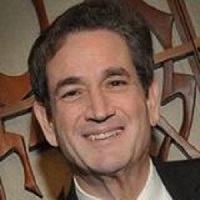By Rabbi Ben Kamin

GAN YAVNEH, Israel—I wiped away a tear as my El Al jumbo jet floated in the sky above the blue Mediterranean and then gracefully tipped its wings over the Tel Aviv skyscrapers and the nearby groves and meadows of my birth-land.
Below, in the sands and the sea foam, was the shining, vulnerable, reverberating expanse of the modern Jewish narrative. Somewhere down there, in the salty waters of freedom, my father had swum out with his comrades to rescue surviving “displaced persons” from the rickety boats Europe had begrudged them after the European genocide.
My grandparents and their friends planted a million seedlings in the unforgiving desert starting even before the twentieth century. In Israel, the trees have souls and I have little descendants who watch You Tube parodies in the language of Elijah.
When I was fourteen, and the Six Day War broke out on June 5, 1967, no one really expected Israel to survive. Knowing that several Arab nations were sworn to murder the Jewish state, rabbis were consecrating hills in preparation for mass burials. Israel’s stunning, lightning victory and its bittersweet acquisition of the West Bank, Gaza, and Sinai (since returned twice to Egypt) gave the Jewish people a fleeting hope that peace would reign at last.
Not so, but the hearty nation does have glittering super-malls, multiplex cinemas, boutique eateries, world-class medical centers, thriving biotech centers, desalination plants, edgy nightclubs, gay pride parades, an unrelenting peace movement, glorious wineries, impossibly famous breakfasts, and a world-class media culture that has spawned everything from Showtime’s Homeland to an array of spy dramas and comedic movie remakes.
My Israel lasts; its people carve normalcy and fun out of the permanent danger and isolation.
Visiting here often in recent times, the reality and poignancy of Israel have made imprints on my heart. Maneuvering emotionally between Tel Aviv’s gleaming white towers and the spoken fears of the elders under intermittent siege, one realizes again the gripping drama of this unique nation.
In March 2012, I knew that the Hamas terrorist syndicate was again firing missiles at and into the towns of Ashkelon, Gedera, and this town of Gan Yavneh. My now departed mother lived in a handsome retirement community in Gedera while several cousins and their children still reside in the nearby seaport city of Ashdod.
None of these citizen-folks folks are part of a military complex nor is Israel seeking an armed conflict with the terrorists that run the Palestinian splinter in Gaza. These people just want to go to school, jobs, coffee houses, the synagogues, and they don’t want to constantly flee to bomb shelters or fortified rooms.
My late mother and the other retirees still living in Gedera have enjoyed their sunlit porches with views of the Judaean hills; they delight in the scholarly lectures delivered in the media-ready theater complex on site; they paint, sing, read, compose, stretch at yoga, and argue over politics.
These people have seen decades of war and terrorism perpetrated by the Arabs; not a few have lost sons and daughters in combat or suicide bombings; all of them marvel at and celebrate Israel’s stunning achievements in the sciences, technology, fine arts, education, and archaeology.
They have heard the wailing sirens and dodged the rockets targeting playgrounds, hospitals, car dealerships, and retirement villages. The so-called nuclear “deal” concluded, they still brood and worry about a thermal Iran, not quite comprehending the concept that they hoped had died with Hitler.
Yet still they retain their stoic vision of a Jewish state that is a haven against the dogged enmity of the Muslim nations now; the Nazis, Czarists, and Romans before. Their adult children and their grandchildren, brandishing iPhones, digital cameras, and books-on-tablets, arrive to visit in their Volvos, BMWs, and Subarus, having driven from Tel Aviv and Haifa and Jerusalem across a smoothly-paved federal highway system or perhaps the state-of-the-art national railway.
My younger daughter Debra, an accomplished international journalist, lives in the hip and brazenly modern city of Tel Aviv. When I was here in 2012, she fretted and did not want me to head down into the Gedera region on a day when I sought to visit my mother. Our cousin, a young mother in Ashdod, was suffering grievously from post-traumatic syndrome under the rain of the deadly missiles. No one in Israel is immune from the bizarre stress and horror of these conditions that intermittently appear.
I remember: sitting with my mother one afternoon, I heard the sirens. The sound, like a searing banshee, came through the open balcony doors and somehow sent me back to images of Dachau and the Warsaw Ghetto. Then, in my ears, came the pop of the missile, unseen but proximate. It hissed at the biblical hills with ballistic menace. The public address system came through the intercom in Hebrew: all were ordered to move into secure rooms. I asked my mother, do you want to move into the special, “safe room?”
“No,” she replied, the weight of Jewish history slightly brushing her. “I’m still having lunch.”
Israel has everything but the peace.
As always, I will come and go. My young nephews and nieces will laugh and sing. My elders sleep in the soil of Israel. Israel is awake and forever.
*
Kamin is an author and freelance writer based in Oceanside, California. He may be contacted via ben.kamin@sdjewishworld.com. Comments intended for publication in the space below must be accompanied by the letter writer’s first and last name and by his/her city and state of residence (city and country for those outside the U.S.)